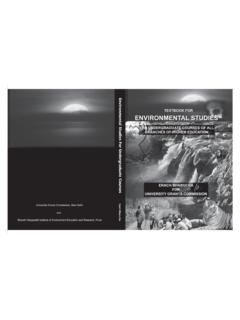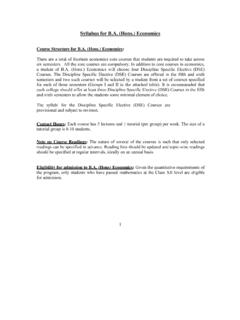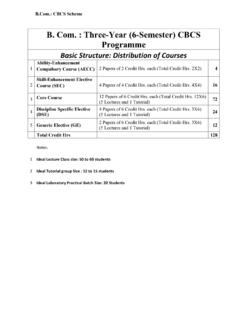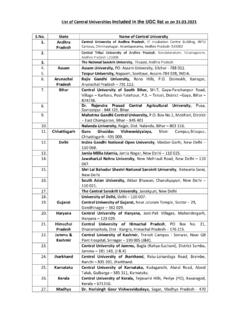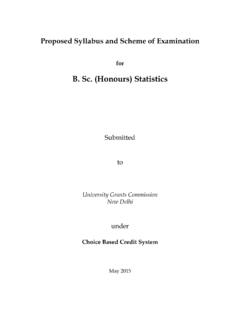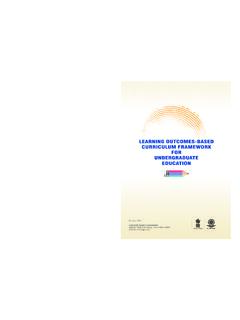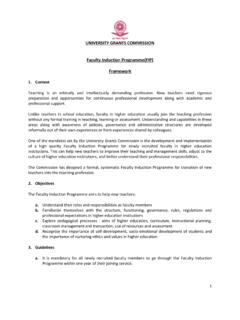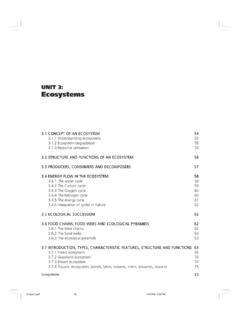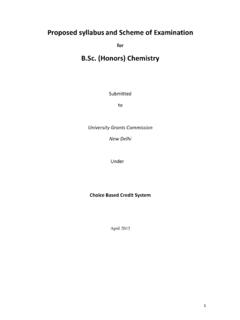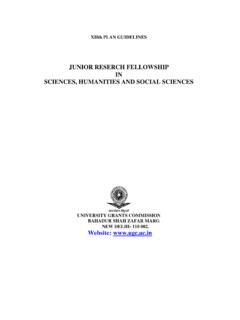Transcription of (To be D. S. Kothari Fellowships) UGC scheme
1 UGC scheme for post-doctoral Fellowships (pdfs). (To be named D. S. Kothari Fellowships). Preamble: Post-doctoral research is an important enabling step in grooming young researchers for launching an academic/research career. This is a transition phase from a largely supervisor directed student at doctoral level to an independent researcher for leadership position, particularly in academia. A. post-doctoral stint also provides an opportunity to acquire new skills, broaden one's horizon and offers a platform for transiting into cross-disciplinary areas. Experience in other parts of the world has shown that university faculty is best inducted from among candidates who had a year or two of post-doctoral training and is generally considered an essential requirement. Mentoring for independent research is an indispensable element of post-doctoral training.
2 Top rated institutions in our country which value research also follow this practice but it has not permeated widely. Leading research groups around the world usually have a good mix of post-doctoral fellows and doctoral students with the former bringing in a level of experience and maturity. However, in our country post-doctoral research culture has not caught on and is practiced only sporadically in a few selected places. Ironically, Ph. D's from leading institutions in India, particularly in basic sciences prefer seeking post-doctoral positions overseas . Within the country, a pdf position is mistakenly viewed as a mere parking opportunity while scouting for a regular appointment. With our higher education system poised for rapid and massive expansion in the years ahead and the establishment of many new science and technology institutions on the anvil, requirement of potential faculty with pdf experience will be very substantial.
3 Thus, a `home grown' pdf program can be expected to partly redeem the expected short fall in trained faculty required for HEI's. It is in this context that UGC initiative to launch a prestigious pdf initiative, named after an illustrious scientist, is important and timely and fills a widely felt void. Several agencies like UGC/CSIR/DST/DBT and a few selected institutions have schemes to award pdfs (also called Research Associateships, RAs) through open call. A few merit-based research schemes funded by various agencies also have provision for pdf/RA. However, the scene is far from satisfactory and opportunities are not only inadequate but the schemes are not optimally structured. This scenario needs change. If is very necessary that a pdf scheme of this nature is run in a flexible mode, with fast track, on=line handling and decision making and must be tuned to the ground realities prevailing in our university system.
4 In our context, with no clearly defined bench marks for thesis quality, a post-doctoral stint for many fresh Ph. D's, may be also an opportunity to overcome the deficiencies at doctoral level research as well as an opportunity to explore new areas of research in different settings. The process outlined below is proposed, keeping some of these factors in mind. Process: a) The selection process would be open all the year round in `..as and ' mode and not restricted by any specified deadlines as thesis submission and award of Ph . D degree are open ended processes. There would be a rolling advertisement on the UGC website; other institutions and UGC affiliates should be encouraged to replicate it on theirs. b) Applications should be submitted electronically on forms that can be downloaded from the web and the entire process would be carried out on-line.
5 C) A standing (core) peer group should be able to access the applications on the web and grade them electronically . On the basis of the grades received (electronically) from the peer group, the Chair of this group takes the final decision. Since this is a promotional scheme to inculcate post-doctoral research culture, , emphasis during the review process/selection should be an appropriate mix of the candidate's accomplishment at Ph. D level and the professional standing of mentor and institution where the post-doctoral research is to be carried out. In general, candidates should be encouraged to move to other institutions and newer areas of research. d) The selection process should be completed within 6-weeks of the receipt of individual application. The whole process should be akin to that employed for manuscript handing and evaluation by leading international Journals and should be a paperless exercise.
6 E) These pdfs should also have an, international flavor and be open to students from other parts of the world, particularly to those from developing and neighboring countries. 0 There could be up to 500 such awards every year, making it to about 1000 at its peak. Eligibility and duration: Candidates who have either received a Ph. D degree or submitted their Ph. D. thesis are eligible to apply. When selected, those holding the Ph. D degree will be directly awarded the named pdf Those who have submitted their Ph. D. thesis may be awarded a `bridging fellowship ' (with marginally reduced stipend) until they are formally awarded the Ph. D degree. The fellowship will be awarded on a yearly basis with renewal/termination clause on the basis of pdf mentor/peer group appraisal. However, the maximum duration of the pdf award would be 3 yrs.
7 Candidates should give an undertaking while availing the award, along with the endorsement of the research mentor, that they would stay in place for a minimum of six months. Stipend: The stipend for these awards should be ,000 pm with annual increase of pm. The `bridging fellowship ' stipend should be Rs. 16, 000 pm. The pdf award should carry a contingency grant of Rs .50, 000 pa. Note: Since the scheme is crafted to work electronically , a dedicated officer/and or senior academic can supervise the whole process and the operational part can be through APO (Application Process Outsourcing).
